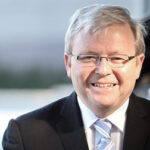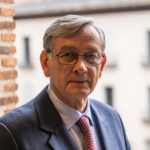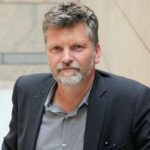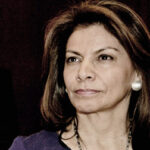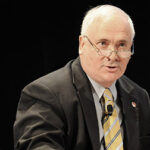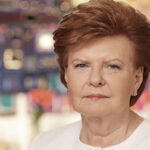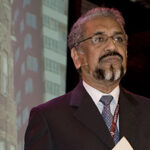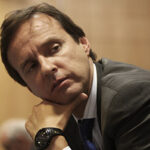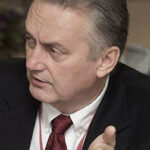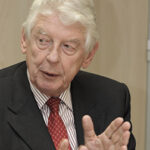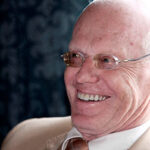Mr Sachs delivered the keynote speech ‘Inclusive Development as a fundamental element in the implementation of Agenda 2030′. In it, he acknowledged the visionary concept and approach of the Shared Societies Project, a Club de Madrid initiative born in 2007 to support political leaders to constructively manage ethnic, cultural, religious and other identity differences while protecting human dignity for all. The Columbia Professor stressed the fact that this project has been “ahead of time. The Sustainable Development Goals came a decade after you started this idea”. The Shared Societies Project has been possible during all this years thanks to the continued and generous support of the Alan B. Slifka Foundation.
In his 30 minutes speech, Jeffrey Sachs warned about the extremely complex situation democracy is going through with an ever increasing gap between the super rich and the poor, an ongoing technological revolution and the serious enviromental challenges. “The market economy can not solve these problems on its own. It needs to be combined with good governance”.
You can rewatch Jeffrey Sachs’ keynote speech here
Ver en #Periscope https://t.co/xfdbcvhEJa
— CLUBdeMADRID (@CLUBdeMADRID) April 10, 2017
Professor Sachs audience was made up of Club de Madrid Members, former Presidents Vaira Vike-Freiberga (Latvia and current President of the CdM), Jorge Quiroga (Bolivia and CdM VP), Cassam Uteem (Mauritius and CdM VP), Valdis Birkavs (Latvia), Laura Chinchilla (Costa Rica) and former Primer Ministers John Bruton (Ireland), Zlatko Lagumdzija (Bosnia Herzegovina), Wim Kok (The Netherlands), Kevin Rudd (Australia), Jennifer Mary Shipley (New Zealand) and Danilo Turk (Slovenia). The keynote speaker had a message for all of them: “We are in a mess, and yet we’ve every tool for solving these problems if we put our minds together. Here s where ur leadership is vital. I ask you to use your experience and public recognition to play a role in a new kind of politics”.
That new approach is a complex one that recognizes we are facing “many interconnected challenges” and that, above all, is “long term, deeper, more transformative, based on scientific and tecnological expertise and calling for democratic participation”.
Yesterday we had the honor to listen to @JeffDSachs when celebrating the 10 years of the Shared Societies Project! https://t.co/bbYQtMJPcq pic.twitter.com/6pkUhWGOIS
— CLUBdeMADRID (@CLUBdeMADRID) April 10, 2017
